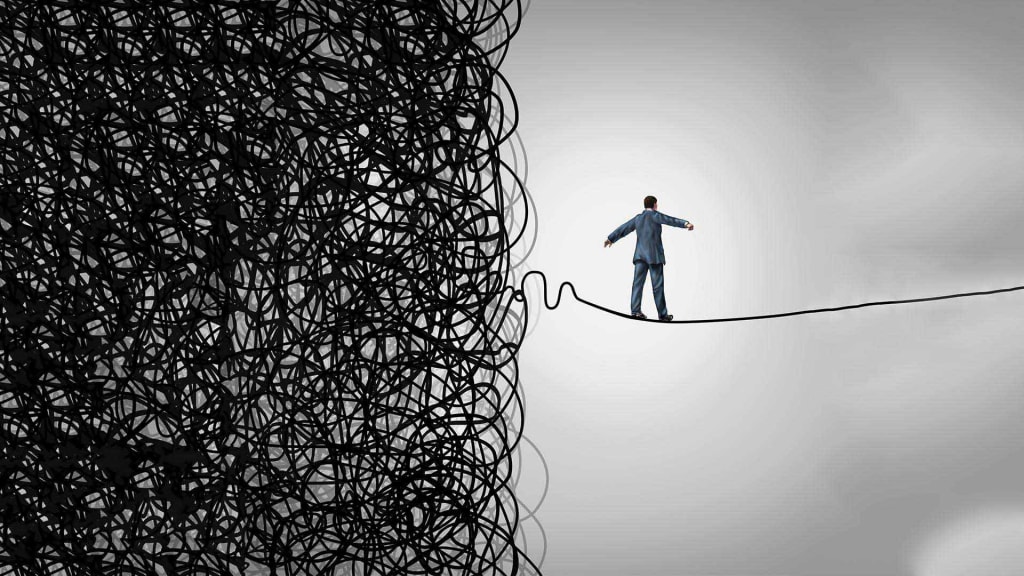Don't Let Fear Rule Your Life
Be fearless in your thoughts and actions...

It’s hard to talk about fear. At any given point in time, there may be a handful of different forms of fear running through us. Perhaps aspects of our life are a direct result of the fear that has come to define the dynamics of our relationships. Perhaps you’re overworked, but afraid of voicing your complaint for fear of being seen as inadequate, or not a team player. Fears of inadequacy and rejection run deep, and can be paralyzing. Fear of failure. Fear of abandonment. Fear of vulnerability. Fear of the past. Fear of the future. Fear of the unknown.
Perhaps you’ve settled into a convenient relationship void of connection, intimacy, communication, or commitment. Perhaps some aspect of your relationship warrants further conversation, but you relent for fear of being misunderstood, for fear of your partner’s reaction out of their own fear of rejection. This fear can cause people to be sensitive, and reluctant to take ownership of their actions, their defects, their baggage. So instead we learn to tolerate various levels of anxiety, fear, pain and feelings of isolation. But deep down, resentment begins to take root. Lack of communication is the result of yet more fears, and this radio silence breeds eventual hostility and volatility that is the result of fears and anxieties and insecurities and doubts that have gone unexpressed, lost all identifying features through mixing together in our unconscious until the source of our anger is so undefinable that we find ourselves in a perpetual mode of fight or flight, and fear again prevents us from acting on the latter. Fear of being alone.
Perhaps fear has kept you alone, or perhaps it is the opposite. Perhaps fear prevents you from being alone. Your loneliness is uncomfortable, either way. Perhaps you surround yourself with others, but fear of rejection or abandonment has resulted in your keeping them at arms’ length. Fear of commitment. Fear of vulnerability. It is hard to humbly showcase your flaws. It takes a self-love and acceptance that is the result of years of mindful living. Rather than identify and accept and learn to love ourselves unconditionally and unapologetically, we seek out signs of our own inadequacy, signs of rejection, signs of our own failures in the actions of our partners and friends. When we are stood up, we internalize it. When our compliments go unreturned, we take note. When our needs go unacknowledged we cop more resentment. Other people are the problem. Everyone disappoints eventually. But deep down we blame ourselves. As a result, we lash out when criticized, while at the same time internalizing it and letting it define our own perceptions. We may see other people as the problem, but deep down we feel perhaps as though we too are not enough.
So, we resign ourselves to a life void of deep connection. It’s too risky. There are too many fears involved. True love and commitment is the needle in the haystack of this fast paced and modern world where communication has been digitized and the art of conversation limited to passing acknowledgments from coworkers, or an exchange of acronyms from friends via text message, friends where the chore of picking up the phone and having a real conversation seems too tiring to commit to. Remember when people used to talk on the phone for hours? Some people still do. Yet again more fear. Fear of having nothing to say? Fear of awkward silence? Fear of rejection? Death by a thousand cuts, perhaps? The fragility of our relationships is just another indicator of our fears, our unwillingness to put ourselves in another’s shoes, our unwillingness to put others first.
In essence, we lack humility. We lack the humility to recognize our fears and insecurities and seek change in the form of self-love and self-acceptance.
Humility breeds empathy. Compassion. The opposite of fear is love, but love is so elusive in this selfish world of instant gratification because we lack the qualities so necessary for love to manifest and grow. Rather than relate we compare. We envy others’ success rather than revel in their fortune by placing ourselves in their shoes. Instead, we bask in the drama of the lives of others. Again, we lack the humility/ability to place ourselves in another’s shoes.
It starts with admitting to ourselves that we are fallible, that were we to inventory all of our actions throughout a given year that we would identify some room for improvement. Were we too selfish, too self-seeking, too insecure, too fearful? Our growth and education doesn’t have to stop at 18, or 22, or 30, or 50. We all have issues. Fears. Baggage. To identify one’s need for growth is a humble acknowledgment that should not invite ridicule from others. Judgment is a narrow minded and ignorant habit that is yet another breeding ground for fear. We let our fear of being labeled inadequate deny us opportunity for growth. “Therapy is for people with real issues. I don’t need that much help.”
I’m not saying everybody needs therapy, but I’m saying that everybody needs to cultivate a level of humility that enables them to identify and grow. To be humble means to be teachable. To be teachable at all times. To be receptive to others’ needs and fears and insecurities, and to not judge, but to accept. To accept another’s perspective as valid. To accept their perspective regarding the way we show up. To not get defensive. Of course, it is important to communicate the anxieties and fears and emotions we feel and sense in ourselves and others in an appropriate and respectful way. That likewise takes a level of introspection and communication that requires patience and a quality of emotional connectedness to oneself that is again the result of identification, acknowledgment, and growth.
I’m not telling you to do anything, I’m just telling you to not let fear rule your life. Don’t reject or shy away from opportunities for personal growth. Humble yourself. Practice putting yourself in another person’s shoes. Stay teachable, and practice open and honest communication often. Love and accept yourself enough so that you can be receptive to the feedback of others without feeling outright rejected.
Learn to identify your fears and insecurities. Then identify what it means to live free from them. What does living fearlessly look like? The practice of living fearlessly is a lifelong practice of mindfulness and growth. It takes other people to enable our growth. Help them live fearlessly too.
About the Creator
Colin Ortstadt
Love. Service. Gratitude. Humility. Success. In that order.






Comments
There are no comments for this story
Be the first to respond and start the conversation.